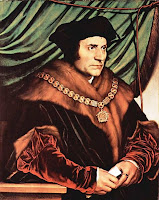 | A Man for All Seasons is a play by Robert Bolt. An early form of the play had been written for BBC Radio in 1954, but after Bolt's success with The Flowering Cherry, he reworked it for the stage. It was first performed in London opening at the Globe Theatre (now Gielgud Theatre) on July 1, 1960. It later found its way to Broadway, enjoying a critically and commercially successful run of over a year. It has had several revivals, and was subsequently made into a feature film and a television movie. |
| The plot is based on the true story of Sir Thomas More (see photo), the 16th-century Chancellor of England, who helps to endorse or denounce King Henry VIII's wish to divorce his aging wife Catherine of Aragon, who could not bear him a son, so that he could marry Anne Boleyn, the sister of his former mistress. The play portrays More as a man of principle, envied by rivals such as Thomas Cromwell and loved by the common people and by his family. The title reflects 20th century agnostic playwright Robert Bolt’s portrayal of More as the ultimate man of conscience. As one who remains true to himself and his beliefs under all circumstances and at all times, despite external pressure or influence, More represents "a man for all seasons." Paul Scofield, who played the leading role in the West End stage premiere, played More again in the first of two film versions (1966), winning an Oscar in the process. | |
"Give The Devil Benefit Of Law" - "A Man For All Seasons" (1966), directed by Fred Zinnemann, tells the story of Sir Thomas More's resistance to King Henry VIII's seizure of the church in England. | |
For Colored Girls Who Have Considered Suicide Top Godspell |